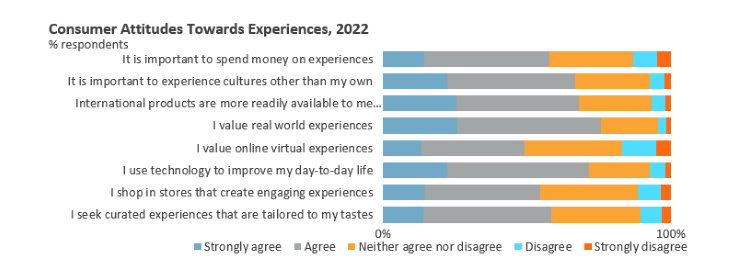Data contained within this article (unless otherwise stated) are taken from a joint study by Euromonitor and Google designed to help marketers better understand in-person visitors to the World Cup. This involved a survey of 1,500 leisure travellers from 13 countries, including the UK, the US, Brazil and China, among others, to capture a detailed understanding of the 1.2 million fans that will descend on Qatar and what they ultimately want from the World Cup experience.
Measuring the impact of any major sports event brings with it a series of challenges. However, the uniqueness of the 2022 World Cup Qatar adds new layers of complexity to assessing the commercial performance of the tournament. Key questions include, “What does the World Cup coming to Qatar mean for the country and the region?”, and “How will fans travelling to the tournament maximise their experience?”.
Putting Qatar in the sports spotlight
As Qatar has worked to make itself tournament-ready, the country has seen investments not only from the public sector, but also private and international players. Since 2010, when Qatar won the bid to host the first-ever World Cup in the region, the country has seen a cumulative value added of around USD34 billion in the economy.
The scale of infrastructure development and economic activity within Qatar has been colossal, and necessary to cater to the 1.2 million travelling fans. Beyond Qatar, the event will benefit neighbouring countries, especially the United Arab Emirates, as travellers look for broader trips across the region.
With the event putting a global spotlight on the region, welcoming new types of travellers and consumer groups, the intangible impact of the event goes well beyond the tournament. Sustained momentum will drive exposure for the region’s hospitality and diversification efforts long after the final whistle.
Football is just one part of the World Cup experience
As important as the performances on the pitch are, travellers want more. They want the ability to shape their overall World Cup experience. For instance, 38% of respondents are willing to explore neighbouring countries, with geographic proximity and affordability being key deciding factors.
Search interest for “distance from UAE to Qatar” confirms nearby travel is a consideration for fans. In 2022, nearly 60% of consumers in Euromonitor’s Global Lifestyles survey said they seek experiences curated to their tastes, while over 70% said they use technology to improve their day-to-day life, an indicator of how technology can enrich fans’ journeys.
The tournament has been described as “the most digital World Cup of all”, and one area where digital services will prove key is ensuring that fans can craft experiences according to their own individual needs.
Visitors are willing to shell out a little extra, but flexibility is key
The number of global consumers planning to increase their spending on leisure travel and holidays has increased to nearly 32% in 2022 – up from 28% in 2021, according to Euromonitor International’s Voice of the Consumer: Travel survey.
Based on the results of the study conducted by Euromonitor International and Google, the average global traveller budget is USD3,500, and travellers are willing to shell out a little extra. However, as traveller budgets vary by region, understanding regional differences is key to curate the traveller experience.
These differences are reflected in traveller profiles and in-destination spending patterns. The study found that 37% of European and 31% of Latin American travellers prefer to stay seven or more nights in a foreign country, while 49% of those from Asia Pacific and 37% from North America choose a shorter stay of around three to four nights.
Travellers are also set to show dynamic behaviours in their path to purchase. When it comes to buying tickets for their stay, 55% of respondents say they always buy flights, transport, and entry tickets separately from other trip arrangements. 36% are less sure, saying they sometimes buy separate tickets, and sometimes purchase packages. What this suggests is that consumers want to be able to choose how to buy as they go. Marketers can meet this need by offering shoppers flexible purchase options.
The stage is set for brands and retailers
More than five billion connected consumers will follow the action in Qatar globally through digital platforms. This offers a wealth of engagement opportunities. Brands, retailers (and others) will be eager to capitalise on World Cup fever to create lasting impressions with fans through creative marketing campaigns and cross-vertical partnership activations on digital platforms.
Understanding fans’ spending habits and their values, alongside their appetite for experiences beyond football, will prove instrumental in achieving off-field success for this unique World Cup.
For more information and insight read, FIFA World Cup Qatar 2022: 4 insights to help marketers connect with the event’s 1.2 million visitors and take a look at our report, World Market for Professional Sports.
